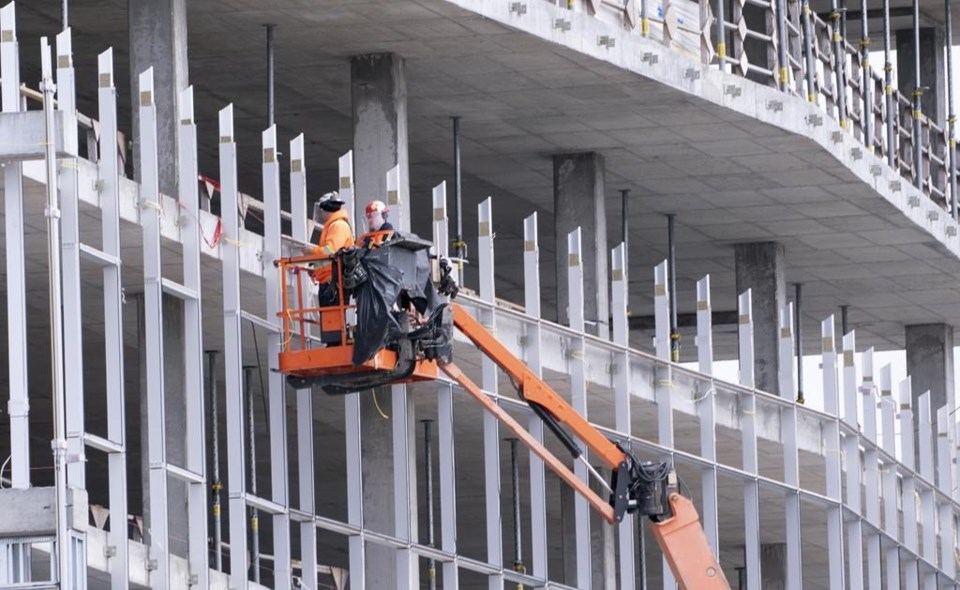MONTREAL — Quebec reported 2,641 new COVID-19 infections and 47 more deaths attributed to the novel coronavirus on Wednesday, hours before the premier is expected to announce a severe lockdown across the province.
Premier Francois Legault is scheduled to hold his first news conference of the new year at 5 p.m., after meeting with opposition leaders on Tuesday.
According to multiple reports, the province may, for the first time since the spring, order "non-essential" manufacturers and the construction sector to close and extend the current closure of schools. The premier is also reportedly planning to impose a provincewide curfew.
Dr. Donald Sheppard, chair of the microbiology and immunology department at McGill University, says Quebec's health-care system is under heavy strain, adding that surgeries and cancer screenings are being postponed and ICUs are filling up.
"The biggest worry is, eventually, if we don't do anything, we'll get to the point where it's going to be the decision where we have two patients, one ventilator and someone has to decide," Sheppard said in an interview Wednesday.
He said the impact of cancelled procedures is already being felt: breast cancer patients are presenting with larger tumours than they were before the pandemic, a sign that they're being diagnosed late.
Quebec's INESSS institute, a government-mandated health-care think tank, warned on Dec. 31 that hospitals in the Montreal area are likely to run out of dedicated COVID-19 beds within three weeks. On Wednesday, the Health Department said hospitalizations jumped by 76, to 1,393 — the largest number since late May — and 202 people were in intensive care, a rise of eight.
"Our hospitals are on the verge of a breaking point," Roxane Borges Da Silva, professor of public health at Universite de Montreal, said in an interview Wednesday. The "partial measures" currently in place in Quebec have had "no effect on the increasing trend of cases."
Much of Quebec, including the province's largest cities, has been under partial lockdown since October, when bars, restaurant dining rooms, gyms and entertainment venues were closed. In December, Legault closed all "non-essential" retail stores and extended the winter break for elementary and high school students.
But while those measures slowed the spread of the virus, they didn't "render the curve flat," Sheppard said.
"We were still in a growth phase and not at a true plateau and that's just continued to get worse, and worse, and worse," he said. "It's obvious that the level of control measures that have been brought in are inadequate."
He said the majority of outbreaks documented by public health have been in workplaces and schools and said while some cases may be due to people breaking the rules, he doesn't think enough people are having illicit parties that would result in more than 2,500 cases a day.
While Sheppard supports shutting workplaces and schools, he said he doesn't understand why a curfew is being considered. If Legault announces a provincewide curfew during his news conference later on Wednesday, he must clearly justify that decision, Sheppard said.
Borges Da Silva, however, said she thinks a curfew makes sense because it will force people to ask themselves whether it's really worth it before they go out and, for example, have a beer with a friend. She said she believes that illicit gatherings over the holidays have had a major impact on the spread of COVID-19 in the province.
Borges Da Silva said she would have liked to see the government act sooner, adding that a "circuit breaker" lockdown during the winter school break could have avoided the need to begin a hard lockdown in early January, which she said will be more disruptive.
Quebec has reported an average of 2,597 new cases a day over the past week, Health Minister Christian Dube said on Twitter Wednesday.
That figure represents 300 cases a day per million people — more than any province in Canada. The next highest is Alberta with 233.8 cases per million, followed by Ontario with 221.9, according to a report released Wednesday by National Bank Financial Markets based on data from Johns Hopkins University.
Quebec's lockdown in the spring came with a steep cost and Quebec's construction and manufacturing sectors warned on Tuesday that another one would be devastating for the province's economy. That lockdown closed around 40 per cent of Quebec's economy for eight weeks and contributed to the loss of around 800,000 jobs, Finance Minister Eric Girard said in June.
The financial cost of the pandemic for the health-care system has also been steep. Girard said in November that the province had spent an additional $5 billion on health care as a result of COVID-19.
Waiting for the government's decision on schools is frustrating for teachers, Heidi Yetman, president of the Quebec Provincial Association of Teachers, said Tuesday. She said educators don't know whether they'll be teaching in-person or remotely come Monday.
She said teaching online is different than in person and that teachers have told her they can spend five hours preparing for a single hour of online teaching.
Officials said 6,221 doses of vaccine were administered Tuesday, for a total of 38,984. Quebec has reported 217,999 COVID-19 infections and 8,488 deaths linked to the virus since the beginning of the pandemic.
This report by The Canadian Press was first published Jan. 6, 2021.
———
This story was produced with the financial assistance of the Facebook and Canadian Press News Fellowship.
Jacob Serebrin, The Canadian Press

